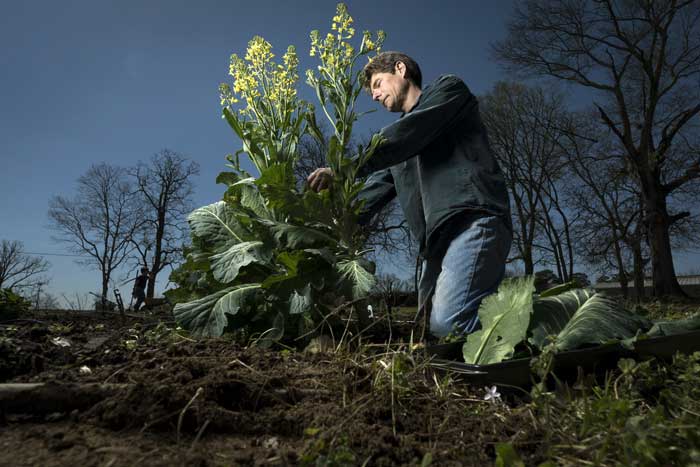Sustainability grant will lead to new greenhouse for Campus Garden, more fresh food for Trojan Food Pantry
The University of Arkansas at Little Rock Sustainability Committee has awarded a $2,500 grant that will provide more growing opportunities for the UA Little Rock Campus Garden as well as an increase in fresh produce for the Trojan Food Pantry.
Dr. Stephen Grace, associate professor of biology, and Dr. Michael DeAngelis, associate professor of Earth Sciences, serve as faculty advisors of the Campus Garden Alliance, which began a partnership in 2016 to provide fresh produce for the Trojan Food Pantry.
The Trojan Food Pantry typically relies on donations of nonperishable food, but staff members are eager to provide healthier options for people who use the food pantry. The Campus Garden Alliance provides the food pantry with produce such as beets, cauliflower, cabbage, greens, tomatoes, peas, peppers, herbs, squash, and onions.
“We intend to install a hoop-style, cold frame greenhouse at the Campus Garden to expand growing capacity and enable year-round vegetable production,” Grace said. “We feel that a greenhouse will greatly enhance the mission and goals of the Campus Garden by providing much needed infrastructure. It will also be used to leverage further improvements at the Campus Garden with the long-term goal of becoming an economically viable center for urban agriculture.”
The Sustainability Committee also awarded two additional $2,500 grants to Dr. John Czarnecki, adjunct professor in the Department of Earth Sciences, and Dr. Ashokkumar Sharma, assistant professor of mechanical engineering technology.
Czarnecki will develop trash barriers for the city’s storm drains in order to reduce the amount of trash that winds up in Fourche Creek.
“Much of the floatable trash entering curbside storm drains in Little Rock ultimately ends up in Fourche Creek, home to 25 percent of all fish species in Arkansas,” Czarnecki said. “The city of Little Rock includes 1,800 acres of bottomland hardwood forests within the Fourche Creek bottoms area. Unfortunately, this area receives regular inputs of floatable trash during flood events. This trash negatively impacts sustainable water quality, ecosystems, and recreation in Fourche Creek bottoms.”
The storm drains have uncovered openings ranging from 5-12 inches in height and 6-12 feet in length, which can allow trash up to the size of a basketball to enter. Commercially made storm drain trash barriers are available, but Czarnecki notes that these cost roughly $1,000 each, making them an impractical option for Little Rock. With the help of construction management and Earth Sciences students, Czarnecki will design, build, and implement cost-effective barriers using readily available materials.
Once he receives permission from the City of Little Rock’s Department of Public Works, Czarnecki and his students will test the barriers on storm drains on the UA Little Rock campus and monitor their progress.
“I greatly enjoy building things and finding solutions that impact society,” Czarnecki said. “Fourche Creek is a spectacularly beautiful natural resource right in the city limits of Little Rock that deserves respect and protection. This project will help attain that goal.”
Sharma will use his grant, “Sustainable Production of Renewable Fuels,” to fund a research-based project to develop a novel thermochemical process to convert the university’s dry solid waste (papers, cardboard, and plastics) to produce a renewable fuel that can be utilized for generation of power and heat energy.
“This research will provide an improved alternative to utilize wastes of public institutions, strengthening the energy independence and economy of the nation,” Sharma said. “This project will demonstrate how it is possible to utilize waste instead of recycling to generate energy.”
He also plans to develop a course for engineering and engineering technology students with an emphasis on sustainability in energy conservation and efficiency. The grant money will be used to construct the reactor system, purchase materials, and fund student travel to present the research at a scientific conference.
In the upper right photo, Dr. Stephen Grace works in the UA Little Rock Campus Garden. Photo by Lonnie Timmons III/UA Little Rock Communications.
